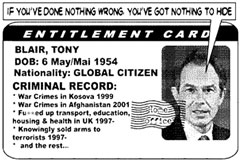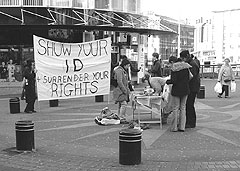
| HOME |
| NERVE |
| REVIEWS |
| ARCHIVE |
| EVENTS |
| LINKS |
| ABOUT US |
| CONTRIBUTORS |
| BACK ISSUES |
| CONTACT US |
 ID Cards
ID Cards
If you’ve nothing to hide why have net curtains?
By Maria Ng
Compulsory identity cards and a National Identity Register are dangerously close to becoming reality. The government is rushing the Identity Cards Bill through Parliament, wanting it done & dusted before this year's election. That means no time to debate & scrutinise a scheme that will cost £5.5 billion to set up and run, for which the technology has not been properly tested, and which will fundamentally change the relationship between us and the state.
The cards would be introduced in a few years, becoming compulsory by around 2013. Our fingerprints and eyes will be scanned to use as biometric identifiers. If we refuse, we'll be fined £2,500. This must be one of a staggering list of fines, including £1,000 for not telling the authorities when we change address, for failing to renew the card, and for not informing them if the card is faulty - though how are most of us supposed to know that? We'll all pay for this compulsory card: £85 for a combined passport/ID card or around £40 for the basic card.
They tell us that the card will not carry much information. What they don't say is that lots more information will go into a National Identity Register database - including a record of every time & place that your ID card is checked. Since the government want us to have to use the card to access all kinds of public services, and want businesses to ask us for our cards too, this adds up to a detailed surveillance record of our everyday lives.
It's frighteningly easy to come up with a long list of serious practical and ethical objections to ID cards. For example: collecting all our information into one central location makes it LESS safe and secure, a valuable target for criminals or terrorists. Or think of the government's history of expensive IT failures at the Child Support Agency, the Passport Office and the Criminal Records Bureau, to name a few. The wording of the Bill gives future governments total licence to add even more types of information to the database (DNA anyone? Medical records? Religion? Sexual preference?) and to allow more public/private organisations to access the database - without needing further consent from Parliament. The possibilities (for abuse) are endless.
 Public fear
of terrorism and prejudice about immigration are being exploited to make
us go along with the introduction of ID cards and other repressive measures
like detention without trial. Saying "I have nothing to hide"
is short-sighted, complacent, and naïve - it is an extremely poor
argument for giving away your rights. Civil liberties are much more than
abstract principles. Consider this: if you have nothing to hide, why bother
with curtains on your windows? A right to privacy is integral to our personal
dignity & freedom. Let's look at it another way - if you have nothing
to hide, then you'll be happy for the police to come and search your house
any time of the day or night without a warrant. No? If you have nothing
to hide then you don't stand for the state treating you like a criminal.
Public fear
of terrorism and prejudice about immigration are being exploited to make
us go along with the introduction of ID cards and other repressive measures
like detention without trial. Saying "I have nothing to hide"
is short-sighted, complacent, and naïve - it is an extremely poor
argument for giving away your rights. Civil liberties are much more than
abstract principles. Consider this: if you have nothing to hide, why bother
with curtains on your windows? A right to privacy is integral to our personal
dignity & freedom. Let's look at it another way - if you have nothing
to hide, then you'll be happy for the police to come and search your house
any time of the day or night without a warrant. No? If you have nothing
to hide then you don't stand for the state treating you like a criminal.
It's decision time: will you obediently hand over your money and submit to being scanned and tracked? Or will you remind politicians that there's a good reason we call them 'public servants?'
Find out more at:
www.defy-id.org.uk
www.no2id.net
Liverpool Defy ID, c/o News From Nowhere Bookshop, 96 Bold Street, Liverpool,
L1 4HY
www.liverpool-defy-id.org.uk